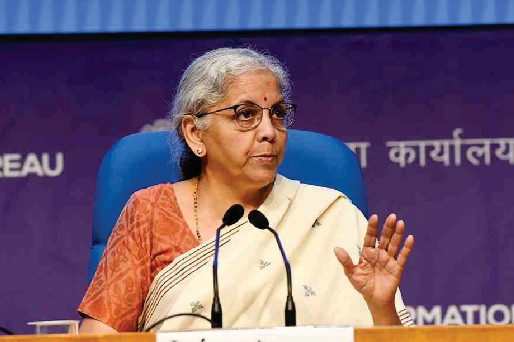
India is capable to become a manufacturing hub
- June 12, 2024
- 0
Global disturbances pose a risk to India’s growth prospects?
More than risks, I would say they pose a challenge: uncertainties are going to increase, people will play safe rather than take calculated risks, investment will certainly be even more pressured. You will have to introduce a lot more in terms of policy certainties that you can give. Over and above that, because of supply chain disruptions, the cost of essentials and commodities will be upside. That will be the biggest challenge. And, how much readiness can you show in anticipation of rising commodity prices and in anticipation of short supply of crude? So the challenges are mounting.
Impact after the West Asia escalation?
The chief economic adviser is looking at various indications of what is coming. Also, the public policymakers in the US, the Fed’s decisions, and the EU’s decisions are all constantly being monitored. The statements that are coming out of the Middle East itself – whether it is Iran versus Israel, or Israel on the Gaza issue – we are closely monitoring. We want to see it all settled and some calm to prevail.
Economies like India, and emerging markets, all are going to disturbed. And is it purely for ourselves? No. We are growing fast, but the world economy is still struggling to come up to some reasonable numbers. Repeatedly, the IMF and the World Bank have been speaking about how it is the emerging markets that are going to be the engine of growth. Now, if the engine itself is going to stutter, it will be very difficult for the global economy to do well. So, it’s in our collective interest, globally, to restore peace.
There is a consensus that inflation will remain high globally and rate cuts are off the table. What does this mean for India?
First of all, I think we should be in a way convinced that the Reserve Bank of India and a few other central banks around the world are taking independent decisions and not synchronising decisions based on what the US Fed does.
Keeping growth in mind is important rather than keeping synchrony. I think India’s central bank is making its decisions with a lot of sense of discretion. Our public sector banks are also clearly aware of the liquidity cycle, the credit input cycle which industries face, and the typical requirements of MSMEs.
The opposition has consistently raised the issues of rural stress, price rise, and unemployment. What is your take?
Congress has ruled this country but it doesn’t believe In India and India’s capabilities. I would even go to the extent of saying that even if it believes that Indians are capable of performing delivering, and achieving for some reason, like Shalya, it constantly keeps saying India can’t reach there or match China. While Shalya did it for some dharmic compulsion, the Congress party is out there to undermine, demoralise the people of India for their vested interests.
Between 2016 and today, look at the spurt in number of startups. Nearly 70,000 are registered. The data, by district, of the number of startups that are getting money without collateral for people to do their own business. You think they are just taking the money and sitting at home? They’re not creating jobs?
Look at the expansion in our real estate sector. Literally, every metropolitan town and every tier II town today is booming in real estate. Is real estate possible without construction workers? Today our service sector is contributing more than 60% of our GDP. Is it devoid of people who are working there?
Are these not jobs? Look at the new age sectors, renewable… today the achievement in solar, you think they are running without people who are maintaining them, establishing them. Outfits of people who are getting these panels together, are they devoid of workers?
Look at the number of small finance banks that have come up, new fintech companies, which are bringing out applications and platforms, are they doing it with a magic wand? I am purposely using the word magic wand, the one with which Rahul Gandhi thinks he is going to use to remove poverty. So, where are these jobs getting counted?
There has been a lot of discussion on next-generation reforms in taxation, especially GST. Is on your to-do list?
In the next GST Council meet, GST simplification will be taken up. As a council, I think, there is recognition that rate rationalisation is one of the very important things. Equally, to clean up the system, which for some reason got muddled in some areas, in some sections on the input tax credit, duty inversion, all that… has to be cleaned up as well.
There is a growing concern in industry on the rising instances of notices by the tax authorities.
While I don’t want to ignore their concerns, I think the situation got muddled because there were some court orders, some time bar-related issues and also because of the transition from manual record keeping to digital record as there was a hiatus between the two the tax authorities had to rely on manual data and if you are relying on manual data, you also want to double check that with the assessee. So you had to send them a notice. These are very legitimate and for sovereign duty performance of tax collection, authorities are duty bound to ascertain and put on record the facts. And, facts cannot be put on record unless the assessees reply. So notices had to be sent. I know when it is year-end, the boards have a tendency to rush. I keep telling them they should start this exercise from October or November rather than March. These can irk tax assessees, I recognise. These will all improve.
What is it alluding to revamping economic and commercial legislations.
Several things that we have already done to some extent ease of doing business, some compliance requirements, too many penal clauses, some penal processes even resulting in a jail sentence, penalties, accumulating, fines being levied – all of them will be made simple. All violations are not with malafide intent. Some can be by error or omission and commission. It has to be looked at… and in order that too many layers of oversight are not there. To make it simpler, we want to look at it all comprehensively.
Do these reforms can be done easily?
Even after passing of bills, problems have risen. Didn’t we pass the agriculture reform bills? And, wasn’t the Land Reform and Rehabilitation Bill of 2013 passed? Look at the consequences of this. The issue actually is of states and also stakeholders all coming on board. They may come on board but when they find full political opportunism… For instance, the three laws of the farm reforms were then supported by the then agriculture ministers.
👇 Please Note 👇
Thank you for reading our article!
If you don’t received industries updates, News & our daily articles
please Whatsapp your Wapp No. or V Card on 8278298592, your number will be added in our broadcasting list.


































































